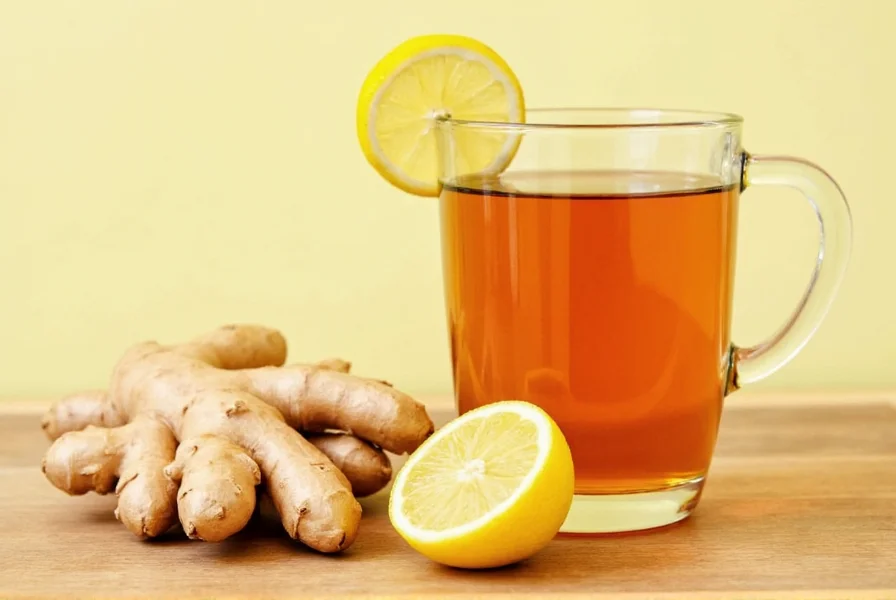Understanding Ginger Tea with Lemon Benefits
Ginger tea with lemon has been used for centuries in traditional medicine systems worldwide. Modern research now validates many of these traditional uses while providing deeper insights into the specific mechanisms behind its health-promoting properties. This simple beverage combines two powerful natural ingredients that work synergistically to support multiple aspects of wellness.
Science-Backed Health Benefits of Ginger Tea with Lemon
Multiple clinical studies have examined the individual and combined effects of ginger and lemon. The health benefits of ginger tea with lemon extend across several physiological systems:
Digestive Health Support
Ginger contains gingerols and shogaols that stimulate digestive enzymes and accelerate gastric emptying. Research published in the World Journal of Gastroenterology found ginger significantly reduces symptoms of indigestion and bloating. When combined with lemon's citric acid, this tea creates an optimal environment for digestion, making ginger lemon tea for digestion particularly effective. Many people find relief from morning nausea or post-meal discomfort by drinking this tea 20 minutes before or after meals.

Anti-Inflammatory Properties
The anti-inflammatory properties of ginger tea stem from ginger's ability to inhibit inflammatory pathways in the body. A comprehensive review in Phytotherapy Research demonstrated ginger's effectiveness in reducing markers of inflammation comparable to some non-steroidal anti-inflammatory drugs (NSAIDs), but without the side effects. Lemon contributes hesperidin and other flavonoids that enhance these anti-inflammatory effects. Regular consumption may help manage chronic inflammatory conditions like osteoarthritis and reduce exercise-induced muscle soreness.
Immune System Enhancement
Vitamin C from lemon works with ginger's bioactive compounds to support immune function. While lemon provides approximately 18.6mg of vitamin C per wedge (about 20% of daily needs), ginger stimulates immune cell activity. The combination creates a powerful synergy for how to make ginger tea with lemon for immunity support. A study in the Journal of Ethnopharmacology found ginger extract enhanced antibody production and immune cell response. This makes ginger lemon tea particularly valuable during cold and flu season or periods of increased stress.
| Benefit | Key Compounds | Scientific Support Level |
|---|---|---|
| Digestive Support | Gingerols, shogaols | Strong clinical evidence |
| Inflammation Reduction | Gingerols, hesperidin | Good clinical evidence |
| Immune Function | Vitamin C, gingerols | Moderate clinical evidence |
| Antioxidant Protection | Flavonoids, phenolic compounds | Strong laboratory evidence |
Antioxidant Protection
Both ingredients provide significant antioxidant benefits. Ginger contains 16 unique antioxidants, while lemon offers vitamin C and flavonoids. Together, they create a powerful defense against oxidative stress. Research in Oxidative Medicine and Cellular Longevity shows this combination helps neutralize free radicals more effectively than either ingredient alone. This scientific evidence for ginger tea benefits suggests regular consumption may support cellular health and potentially slow age-related decline.
Traditional Uses vs. Scientific Evidence
Many cultures have used ginger tea with lemon for centuries to treat various ailments. While modern science validates several traditional claims, it's important to distinguish between well-supported benefits and anecdotal reports:
- Well-supported: Nausea relief, digestive support, anti-inflammatory effects
- Moderately supported: Immune enhancement, respiratory support
- Limited evidence: Weight loss promotion, blood sugar regulation
Most studies showing significant effects used concentrated ginger extracts rather than tea preparations. The potential side effects of ginger tea with lemon are generally mild but may include heartburn in sensitive individuals or interactions with blood-thinning medications at very high consumption levels.
Optimal Preparation Methods
To maximize the health benefits of ginger tea with lemon, preparation matters:
- Use fresh ginger root (1-2 inches) sliced or grated
- Steep in boiling water for 10-15 minutes (longer for stronger effects)
- Add fresh lemon juice after cooling slightly (above 60°C/140°F degrades vitamin C)
- Consider adding a small amount of healthy fat (like coconut oil) to enhance absorption of fat-soluble compounds
The best time to drink ginger lemon tea varies by purpose: morning for digestion support, after meals for nausea relief, or evening for relaxation. Most research suggests 1-2 cups daily provides optimal benefits without risk of side effects for most adults.

Important Considerations and Limitations
While generally safe, certain populations should exercise caution:
- Pregnant women should limit consumption to 1 gram of ginger daily
- Those on blood thinners should consult their physician
- People with gallstones should avoid large quantities
- May interact with diabetes medications
Ginger tea with lemon should complement—not replace—medical treatment for serious conditions. The benefits are generally subtle and cumulative rather than immediate or dramatic. For therapeutic effects beyond general wellness support, consult a healthcare provider about appropriate ginger supplementation.
Conclusion
Ginger tea with lemon represents a simple, accessible way to incorporate evidence-based wellness practices into daily life. The combination offers genuine health benefits supported by growing scientific research, particularly for digestive health, inflammation reduction, and immune support. By understanding both the proven benefits and limitations, you can make informed decisions about incorporating this traditional beverage into your wellness routine. As with any natural remedy, consistency and realistic expectations yield the best results.
Frequently Asked Questions
How much ginger tea with lemon should I drink daily for health benefits?
Most research suggests 1-2 cups daily provides optimal benefits. Each serving should contain 1-2 inches of fresh ginger root steeped for 10-15 minutes. Consuming more than 4 grams of ginger daily may cause digestive discomfort in some individuals. For therapeutic purposes beyond general wellness, consult a healthcare provider about appropriate dosing.
Can ginger tea with lemon help with weight loss?
While ginger tea with lemon may support weight management as part of a comprehensive approach, it's not a standalone solution. Some studies suggest ginger may slightly increase metabolism and reduce appetite, but effects are modest. The primary weight-related benefit comes from replacing sugary beverages with this zero-calorie alternative. Significant weight loss requires dietary changes, exercise, and behavioral modifications.
When is the best time to drink ginger lemon tea for maximum benefits?
The optimal timing depends on your goals: morning on an empty stomach supports digestion and metabolism; 20 minutes before meals reduces nausea and aids digestion; after meals alleviates bloating; and evening promotes relaxation. For immune support, spread consumption throughout the day. Avoid drinking too close to bedtime if ginger affects your sleep.
Are there any medication interactions with ginger tea?
Yes, ginger may interact with blood-thinning medications like warfarin due to its mild anticoagulant properties. It may also affect diabetes medications by lowering blood sugar. If you take medications for high blood pressure, heart conditions, or diabetes, consult your healthcare provider before consuming ginger tea regularly. Most interactions occur with high-dose supplements rather than moderate tea consumption.
How long does it take to experience benefits from ginger tea with lemon?
Some effects like nausea relief may be noticeable within 30-60 minutes. Digestive benefits often become apparent within a few days of regular consumption. Anti-inflammatory and immune-supporting effects typically require consistent daily consumption for 2-4 weeks to notice significant improvements. The timeline varies based on individual physiology, the specific benefit sought, and overall health status.











 浙公网安备
33010002000092号
浙公网安备
33010002000092号 浙B2-20120091-4
浙B2-20120091-4